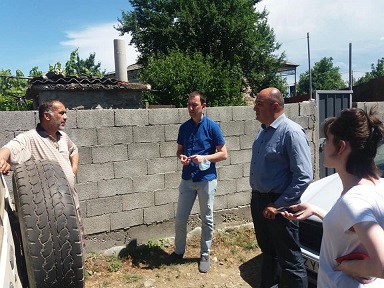Lado Bitchashvili, Shida Kartli
As a result of the shifted occupation line, additional 15 hectares of the land was occupied in Takhtisdziri village in Kareli municipality. The locals had already started spring works on their agricultural plots, when occupants appeared and installed polls of the fence. Nowadays, the representatives of the occupant regime have suspended the so-called border demarcation process but the locals had to leave their plots, which were already prepared to sow. The residents of Takhtisdziri village expect the occupants to appear in their village and resume borderization process every day.
“They are likely to start installment of the barbed wires and fences soon,” Lasha Tsnoriashvili from Takhtisdziri village said, whose land is now on the occupied territory. It was the only agricultural land of his family, which was located on the embankment of the Prone River but now they have no access to it. Lasha Tsnoriashvili, like his neighbors, owned the plot more than 20 years though it was not registered.
“We applied to the public registry but they did not register our land because it was located close to the occupation line,” Lasha Tsnoriashvili said and addressed the Government of Georgia to get interested in the situation of the population of Takhtisdziri village, who are victims of occupation; he urges the authority to give alternative plots to them or compensation instead of the lost properties.
“Nobody has arrived here and got interested in our problems; nobody offered us to give alternative plots to compensate the lost properties,” Tsnoriashvili said.
About 15 locals lost properties in Takhtisdziri village as a result of the resumed occupation. The occupation regime misappropriated another 15 hectares of the land. Liana Kopadze’s family is among them, who lost about one-hectare land.
“We lost almost one-hectare land; the occupants are installing the polls on the embankment of the Prone River and so far the plots of about 15 locals turned up on the other side of the occupation line. We request the government to pay attention to us,” Liana Kopadze said.
The residents of the village alongside the occupation line spoke about their problems with the Human Rights Center and urged them for help.
HRC representative Ucha Nanuashvili said that the Government must not leave the inhabitants of Takhtisdziri village alone in front of the problems caused by the creeping occupation.
“Big part of the local population does not have their plots registered and when they lose the land as a result of occupation, part of the Takhtisdziri village population cannot appeal the court because of the bureaucracy and policy of the National Agency of Public Registry, which denies the citizens to register the land if they are located close to the occupation line. It is not right. The state shall assist the locals to register their lands. Legal registration of the land is another instrument to stop the creeping occupation. We could have more legal leverages to start litigation in the international courts, if the plots were registered,” Ucha Nanuashvili said and called on the Government of Georgia to change the policy and support the locals to register their plots located alongside the occupation line instead hindering this process.
Besides the problems related with the occupation, the locals complain about hard social-economic problems in Takhtisdziri village. They remind the authorities of their pre-election promise to give the status of mountainous zone to the village. They say the benefits envisaged for the population of the mountainous zone could be a relief for them.
“We request the status of the mountainous zone for our village. The social benefits envisaged under the law might not be important for some people but it will be a relief for us to encourage the locals not to abandon the village nearby the occupation line and stop migration. There are 40 pupils in Takhtisdziri public schools nowadays and their number is cutting down every year,” the locals said.
The residents of the neighboring village of Dirbi also request the status of the mountainous village. It is also located close to the occupation line and the barbed wires were set up in the plots of the locals there too; however, the locals continue cultivation of the plots and are not afraid of grave social-economic problems.
“They resolved the problem of drinking water, they installed counters too but the drinking water is not running from our taps and we have to fetch the water from the village center,” Zaza Bliadze from Dirbi said, who has to bring home several tones of water every day.
“We have queues here permanently. People are either working in their plots or are fetching water from the village center. If somebody does not want to stand in the queues, they collect water during night,” Zaza Bliadze said.
HRC representative Ucha Nanuashvili said the issue of drinking and irrigation water is still a major problem in the villages alongside the occupation line.
“Although part of the problems were resolved in the villages alongside the occupation line – like roads, which were covered with asphalt and natural gas supply in the villages, the issue of drinking and irrigation water is still a problem; I think the government shall pay particular attention to the residents of the villages near the occupation line. People here live in such hard social-economic conditions that they urge for the status of the mountainous zone in order to get at least some social benefits. The authority shall implement economic policy focused on the needs of the local population and be particularly sensitive towards the people living nearby the occupation line,” Ucha Nanuashvili said.
HRC will prepare the report about the problems raised by the residents of the villages alongside the occupation line and will develop recommendations to respective state institutions.
News
December 13, 2023
Ethnic minorities outside the peace dialogue
November 6, 2023
‘Peace’ agenda of political parties
Popular
Articles
February 13, 2024




